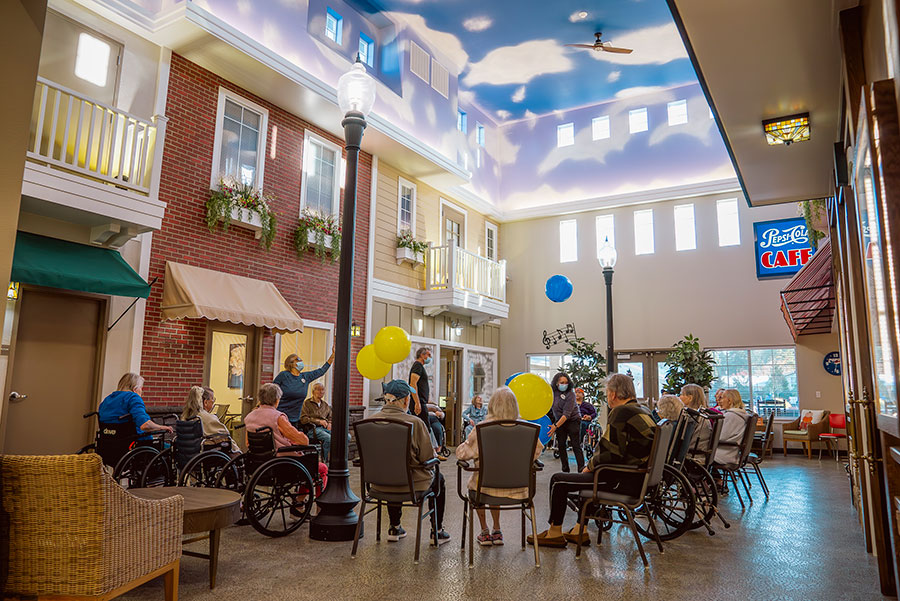Find Small Memory Carehomes Charlotte Families Recommend
Wiki Article
All About Memory Care Providers: Why Tiny Memory Treatment Residences Are a Fantastic Option
Memory treatment solutions play an important role in supporting people with Alzheimer's and dementia. Tiny memory care homes attract attention for their tailored strategy and intimate setup. With lower staff-to-resident ratios, these homes foster stronger connections and tailored treatment. Homeowners take advantage of improved social interactions and a secure environment. As families explore choices, understanding the special benefits of little memory care homes becomes important. What variables should be thought about when choosing the ideal home?Understanding Memory Treatment Provider
While many may know with general elderly treatment alternatives, comprehending memory treatment solutions is necessary for families dealing with the obstacles of cognitive decline. Memory treatment specifically satisfies people with problems such as Alzheimer's condition and other types of mental deterioration. These services provide a structured atmosphere that focuses on improving the quality of life for homeowners via specialized care and support.Memory care centers are made to ensure safety and security and protection, commonly including secured atmospheres to avoid wandering. Trained team member are offered around the clock to assist with everyday tasks, medication monitoring, and individual care. Additionally, memory treatment programs commonly include cognitive stimulation tasks, tailored to involve residents and advertise mental health. Families can gain from comprehending these services, as they enable informed decisions concerning their enjoyed ones' treatment, making certain that their certain demands and choices are dealt with in a thoughtful and encouraging fashion.The Benefits of Little Memory Care Houses
Little memory treatment homes provide distinct benefits that can substantially enhance the high quality of life for homeowners with cognitive disabilities. One significant advantage is the intimate setting, which enables personalized interactions amongst staff and locals. This smaller setup fosters significant partnerships, minimizing sensations of seclusion and stress and anxiety often experienced by individuals with memory issues.Additionally, the lower staff-to-resident ratio in small memory care homes enables caregivers to supply even more attentive supervision and assistance. This approach not only improves safety and security however additionally advertises a complacency for the residents.Moreover, tiny memory treatment homes can adapt quickly to the one-of-a-kind needs and preferences of each local, enabling a much more homelike environment. Such an atmosphere can encourage social involvement and involvement in activities, ultimately enriching the everyday experiences of those dealing with cognitive problems.Personalized Treatment Plans for Citizens
Personalized treatment strategies are essential in memory care homes, as they accommodate the one-of-a-kind demands and choices of each local. These strategies start with complete analyses carried out by competent experts, that review cognitive abilities, clinical history, and individual passions. This tailored approach assurances that care is not only effective however additionally considerate of each person's self-respect and autonomy.Moreover, individualized care strategies are versatile, allowing modifications as residents' needs advance in time. This flexibility cultivates a complacency and experience, which is vital for individuals living with memory difficulties. Caretakers are educated to implement these strategies consistently, providing support that aligns with the citizens' routines and preferences.Ultimately, customized treatment plans boost the lifestyle for homeowners by advertising interaction, independence, and wellness, making them an essential element of memory treatment solutions in tiny memory treatment homes.Producing a Home-Like Environment
Creating a home-like setting is vital for promoting comfort and knowledge in memory treatment settings, as it significantly affects citizens' emotional wellness. Tiny memory treatment homes frequently prioritize individualized touches, such as warm color schemes, family pictures, and acquainted furniture plans, which help locals feel a lot more at ease. Incorporating components reminiscent of a typical home, like relaxing home and communal areas, urges a feeling of belonging.Moreover, using all-natural light and outside areas can boost the environment, promoting relaxation and serenity. Team members play a considerable function in keeping this environment by engaging with homeowners in a thoughtful fashion, treating them like family. Routine tasks, such as food preparation or gardening, can additionally contribute to a home-like feel, using opportunities for residents to take part in purposeful experiences. Generally, developing a nurturing environment supports cognitive function and emotional security, making it a crucial facet of memory treatment solutions.
Enhanced Social Interaction and Area
Boosted social communication and neighborhood are essential parts of memory care services. By promoting individualized social engagement and developing a family-like ambience, these services advertise significant links among homeowners. Team tasks and events better encourage engagement, helping people really feel much more included and sustained.Customized Social Interaction
While social interaction is crucial for general wellness, many people with memory impairments frequently struggle to engage meaningfully with others. Customized social involvement in memory care homes addresses this challenge by producing customized activities that deal with homeowners' special rate of interests and abilities. By concentrating on individual preferences, caregivers can cultivate connections that reverberate deeply with each individual. Tasks such as art treatment, music sessions, and directed conversations advertise cognitive stimulation and emotional expression. In addition, tiny team settings encourage friendship and permit even more intimate communications, boosting sensations of belonging. This approach not just battles sensations of isolation however also encourages residents to keep a sense of identification, inevitably adding to enhanced mental wellness and top quality of life.Family-like Atmosphere
In a memory care setup, fostering a family-like environment substantially boosts social communication and constructs a sense of area among locals. Smaller memory care homes typically prioritize intimate atmospheres, permitting locals to form closer links with one an additional and personnel participants. This nurturing ambience promotes trust, which is essential for individuals with memory impairments. Homeowners are most likely to involve in discussions and share experiences, creating a helpful network that minimizes sensations of solitude. The experience of common rooms and regimens adds to a feeling of belonging, even more urging social communication (personalized memory care). In such setups, psychological bonds prosper, resulting in boosted general health and a better of life for homeowners as they browse their day-to-day experiences with each otherGroup Activities and Events

Safety and Protection Features in Little Houses
Several small homes developed for memory treatment incorporate crucial safety and security and safety and security features to assure the well-being of locals. These homes typically use safe entrance and departure points to prevent wandering, a typical problem among people with memory problems. Additionally, surveillance systems and alarm system mechanisms enhance monitoring, making sure that team can promptly react to any type of uncommon activities.Interior layouts are customized for safety, with lessened threats such as sharp edges and clutter-free paths. Handrails and non-slip floor covering are commonly installed to minimize the threat of falls. Employee are educated in emergency protocols, ensuring they are prepared for different situations.Moreover, customized care strategies may include analysis of individual security demands, providing tailored services for each and every citizen. Generally, these safety and security and safety and security attributes develop a nurturing environment where residents can grow while keeping their self-respect and independence.Exactly how to Select the Right Memory Treatment Home
How can family members ensure they choose one of the most suitable memory treatment home for their enjoyed ones? The choice requires mindful factor to consider of a number of variables. First, families ought to examine the facility's staff credentials and training, guaranteeing that caregivers are experienced in taking care of memory-related problems. Next, it's vital to evaluate the home's environment, focusing on safety and security attributes and whether it fosters a feeling of neighborhood and belonging. Going to the facility can provide understanding right into day-to-day activities and the social environment, which are necessary for mental stimulation and emotional health. In addition, family members must ask about the care strategies supplied, guaranteeing they are tailored to specific needs. Finally, considering the home's area and ease of access for family members brows through can add to a smoother change. By dealing with these aspects, family members can make an educated choice that prioritizes their liked one's convenience and quality of life in a memory care setting.Regularly Asked Concerns
What Certifications Should Personnel Members in Memory Treatment Homes Have?
Team member in memory care homes need to possess appropriate certifications, experience in dementia treatment, strong interaction skills, and compassion. Ongoing training in behavior monitoring and healing interventions enhances their capacity to support locals efficiently.Exactly How Do Memory Treatment Provider Differ From Conventional Assisted Living?
Memory treatment solutions concentrate specifically on people with memory impairments, giving specialized support and structured environments. In comparison, traditional assisted living provides general aid with everyday activities, lacking the tailored approach essential for those with cognitive difficulties.What Kinds of Activities Are Provided in Memory Treatment Homes?
Memory treatment homes generally supply a selection of boutique memory care activities made to involve homeowners. Typical alternatives consist of art treatment, songs sessions, cognitive games, workouts, gardening, and gatherings, all focused on enhancing well-being and cognitive function.Can Locals Bring Their Own Valuables to Memory Treatment Houses?
Residents can commonly bring their own valuables to memory treatment homes, enabling them to individualize their home - personalized memory care. This practice assists develop a familiar environment, advertising convenience and a feeling of identity for the people
Exactly How Are Relative Associated With the Treatment Refine?
Relative play a crucial function in the treatment procedure, commonly taking part in decision-making, attending care meetings, and providing emotional assistance. Their participation cultivates a joint environment, boosting the local's overall wellness and quality of life. While numerous may be familiar with basic elderly care choices, comprehending memory treatment services is important for families dealing with the difficulties of cognitive decrease. These solutions give an organized atmosphere that focuses on improving the top quality of life for homeowners via specialized treatment and support.Memory care facilities are made to guarantee safety and security and security, often including safeguarded environments to protect against wandering. Customized treatment strategies are crucial in memory care homes, as they cater to the unique requirements and choices of each citizen. Personnel participants in memory treatment homes should possess relevant accreditations, experience in dementia treatment, strong communication abilities, and empathy. Memory treatment services concentrate specifically on people with memory impairments, providing specialized support and structured settings.Report this wiki page